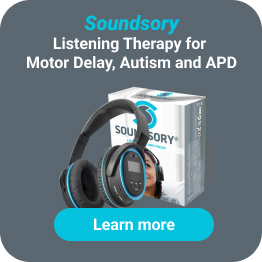Everything You Need To Know About Samonas Sound Therapy
 Rebecca Huxley
Rebecca Huxley Physiotherapist
February 15, 2024
Introduction
Samonas Sound Therapy is a type of listening therapy that uses specialized headphones to deliver electronically modified music. The goal of Samonas is to improve auditory skills over a period of repeated listening. This can be particularly useful for children with Autism and Auditory Processing Disorder (APD).
Samonas is a potential complementary therapy to the Soundsory® program, a 40-program of music to movement. In this article, we’ll explore what Samonas is, the theory behind how it works, and who can benefit from Samonas sound therapy.
Key Take-Away Messages
| What is Samonas sound therapy? |
| Samonas sound therapy is a type of therapy that uses specialized headphones to deliver electronically modified music. The program may improve auditory processing, attention, and motor and communication skills. This can be particularly useful for children with Autism and APD. Here are the key features of Samonas sound therapy: Music is modified to enhance the upper-frequency range of sounds Usually a home-based program Requires specialized headphones and the Samonas CDs or app Samonas trained practitioners can help to personalize the program correctly The goal of the program is to regulate and energize the brain |
PROS
✅ Convenience: Samonas is usually delivered as a home-based program. Children can also complete other quiet tasks, such as school work or reading, while listening to the Samonas program.
✅ Personalized approach: Music selections, intensity and listening times are adjusted for each child. This can be done by parents following self-study, or assisted by a Samonas trained practitioner.
✅ Minimal equipment required: The only things required are specialized headphones, and either the Samonas app or CDs.
CONS
❌ Time-intensive: Time commitment varies for each child, but programs often require 5-45 minutes per day, for 4-7 months. There are usually 2 listening sessions per day.
❌ Some children will require additional programs: The program is listening-based therapy only, some children will also require therapy with a movement aspect.
❌ Initial setup required: To select the correct music, intensity and listening times, parents either need to attend a training session or study the online guides provided by Samonas.
If you’re looking for a program which contains a movement element and requires no initial setup, try Soundsory®. The 40-day Soundsory® program offers a wide range of in-program auditory processing activities.
Soundsory® can boost kids’ neurodevelopment by pairing enhanced rhythmic music with holistic, whole-body exercises. It makes a great complementary therapy to Samonas or works well as a standalone program.
What is Samonas sound therapy?
Samonas stands for Spectrally Activated Music of Optimal Natural Structure. Samonas is a type of listening therapy that aims to energize and regulate the brain.
Ingo Steinbach, the founder of Samonas, created a device that enhances the upper-frequency range of music. The music selected for Samonas is mostly classical music and nature sounds.
The theory behind Samonas sound therapy is that listening to these upper-frequency sounds trains the brain to pay attention to the upper ranges in the sound spectrum. The goal of this is to induce changes in the brain that lead to improvements in attention, social engagement, and higher-level motor and communication skills.
Who can benefit from the Samonas sound therapy program?
The Samonas sound therapy program may benefit children and adults with APD and Autism. Children with APD struggle to process auditory information, so Samonas may be useful as it aims to improve auditory attention and processing skills.
Children with Autism often struggle with social, communication and motor skills [1]. Samonas sound therapy aims to improve these three skills, so children with Autism may benefit from this program.
What is the time commitment for the Samonas program?
The time commitment for Samonas is different for each child. Children usually listen to the Samonas CDs for 5-45 minutes per day, often split into two sessions.
The length of the program varies depending on the child’s needs and age. It is common for the program to run for 4-7 months. Children are allowed and encouraged to take part in other quiet activities while listening to the Samonas CDs, including schoolwork, puzzles and reading.
How much does Samonas cost?
The cost of Samonas depends on the approach you take as a parent. The advice from Samonas is to invest in a training session with a Samonas trained practitioner, who can help you select the best listening protocol for your child.
The cost for parent training is around US $120. The cost for the equipment required (headphones and Samonas CDs/access via the app) is between US $300-$500.
Is there research behind the Samonas sound therapy program?
Research suggests that Samonas sound therapy can improve social engagement in children with Autism Spectrum Disorder (ASD) [2]. However, this study was Singapore-based and only investigated 11 children with ASD.
More research is needed to confidently state that Samonas improves symptoms ASD and APD in children. However, this is the case for most sound therapies and there are studies that make positive references to Samonas based on personal experience. [3]
Are there alternatives or complementary approaches to Samonas?
Soundsory® is a complementary approach to Samonas. Soundsory® is a 40-day program of movement to music – it aims to enhance neurodevelopment for children with Autism, Attention Deficit Hyperactivity Disorder (ADHD), motor delay and sensory processing difficulties.
Soundsory® helps children to integrate primitive reflexes through a series of activities to music that are repeated daily. Regular repetition of these exercises helps children build strong neural networks and improve sensorimotor skills.
We’ve provided a table below to compare these two programs at a glance:
| Aspect | Samonas Sound Therapy | Soundsory® Program |
| Focus | Auditory processing, attention, motor and communication skills | Auditory stimulation, sensory processing, holistic neurodevelopment, attention enhancement |
| Techniques | Listening to music with modified sound frequencies | Music, rhythm, movement exercises, auditory stimulation |
| Delivery | Requires specialized headphones and the Samonas CDs or app | Requires patented bone conduction headphones |
| Practitioners | Samonas trained practitioners | Self-guided program |
| Personalization | Music selections, intensity and listening times are adjusted for each child | Structured program, less individual customization |
| Application | Usually used at home as part of a daily routine | Usually used at home as part of a daily routine |
| Target Audience | Children and adults with APD and Autism | Children with Autism, ADHD, motor delay, sensory processing difficulties, attention difficulties |
| Integration with Other Therapies | Can be used as a standalone therapy, or with other therapies including movement aspects as needed | Primarily a standalone program |
| Overall Approach | Electronically enhanced music regulates and energizes the brain | Auditory stimulation, sensory processing, attention enhancement |
| Independence and Convenience | Requires research or guidance from trained practitioners | Can be practiced independently at home |
Other complementary approaches to Samonas include the Brain Gym® Program, Interactive Metronome® and Forbrain®. Each link leads to a full guide to each type of therapy.
Conclusion
Samonas sound therapy is a type of listening therapy that uses electronically enhanced music. Samonas aims to energize and regulate the brain, which may have a positive impact on some symptoms of APD and Autism. It can be used alone or combined with complementary therapies such as Soundsory®, which uses rhythmic music and specialized, home-based exercises to build stronger neural connections.
FAQs
What does Samonas mean?
Samonas stands for Spectrally Activated Music of Optimal Natural Structure. The goal of Samonas is to energize and regulate the brain.
What is Samonas sound therapy?
Samonas sound therapy is a type of listening therapy that uses electronically enhanced music played through specialized headphones. This may positively impact some symptoms of Autism and APD.
Is sound therapy safe?
Although sound therapy is generally safe, it’s best to consult your healthcare provider before starting any new type of therapy with your child. This is particularly true if your child tends to react strongly to new sensory experiences.
References
- Cheung, W. C., Meadan, H., & Xia, Y. (2021). A Longitudinal Analysis of the Relationships Between Social, Communication, and Motor Skills Among Students with Autism. Journal of Autism and Developmental Disorders. https://doi.org/10.1007/s10803-021-05328-7
- Pitkola, S. M. (2016). Effectiveness of SAMONAS Sound Therapy (SST) in improving social engagement of children with Autism Spectrum Disorder. Minerva-Access.unimelb.edu.au. https://minerva-access.unimelb.edu.au/items/ed3cccff-1da9-5ac3-8ae7-174059769385
- Cooper, S. (2010). Sound Therapy Restores Hearing -Fact of Fiction? A personal experience of an acoustician. https://www.acoustics.asn.au/conference_proceedings/ICA2010/cdrom-ICA2010/papers/p327.pdf



